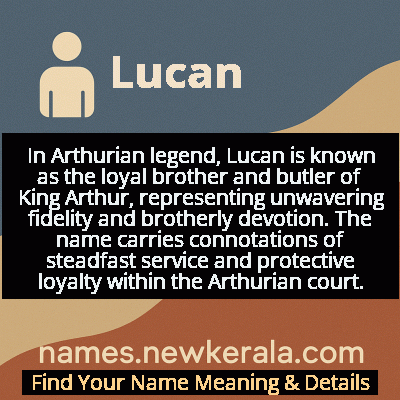Lucan Name Meaning & Details
Origin, Popularity, Numerology Analysis & Name Meaning of Lucan
Discover the origin, meaning, and cultural significance of the name LUCAN. Delve into its historical roots and explore the lasting impact it has had on communities and traditions.
Name
Lucan
Gender
Male
Origin
Arthurian
Lucky Number
6
Meaning of the Name - Lucan
In Arthurian legend, Lucan is known as the loyal brother and butler of King Arthur, representing unwavering fidelity and brotherly devotion. The name carries connotations of steadfast service and protective loyalty within the Arthurian court.
Lucan - Complete Numerology Analysis
Your Numerology Number
Based on Pythagorean Numerology System
Ruling Planet
Venus
Positive Nature
Harmonious, responsible, caring, and artistic.
Negative Traits
Overly idealistic, superficial, possessive, or jealous.
Lucky Colours
Pink, turquoise.
Lucky Days
Friday.
Lucky Stones
Diamond, turquoise.
Harmony Numbers
2, 3, 9.
Best Suited Professions
Artists, musicians, teachers, healthcare workers.
What People Like About You
Warmth, nurturing nature, artistic flair.
Famous People Named Lucan
Lucan the Butler
Knight of the Round Table
One of the earliest members of the Round Table, served as King Arthur's cup-bearer and trusted companion
Marcus Annaeus Lucanus
Roman Poet
Author of the epic poem 'Pharsalia' about the civil war between Julius Caesar and Pompey
Lucan of Lismore
Irish Saint
Early Irish saint and bishop who founded churches in Ireland and Scotland
Lord Lucan
British Aristocrat
Notorious figure who disappeared after the murder of his children's nanny in 1974
Name Variations & International Equivalents
Click on blue names to explore their detailed meanings. Gray names with will be available soon.
Cultural & Historical Significance
Beyond Arthurian tradition, the name carries classical weight through the Roman poet Lucan, whose epic 'Pharsalia' was widely studied throughout the Middle Ages and Renaissance. In Irish tradition, Saint Lucan of Lismore represents the Christianization of Celtic lands. The name's dual heritage—combining Arthurian chivalry with classical learning—has made it enduringly attractive across different cultural contexts, symbolizing both martial loyalty and intellectual achievement.
The name also connects to the Celtic god Lugh, adding a layer of mythological significance. This multifaceted cultural background gives Lucan a rich tapestry of meanings that has allowed it to remain relevant across centuries, appealing to those who value historical depth, literary connections, and symbolic resonance in a name.
Extended Personality Analysis
Individuals named Lucan are typically characterized by strong loyalty, dependability, and a protective nature toward those they care about. Drawing from the Arthurian knight's portrayal, they often exhibit a calm, steady demeanor and a willingness to serve others without seeking glory for themselves. Lucans tend to be the reliable foundation in relationships and organizations—the person others turn to in crises because of their unwavering commitment and practical problem-solving abilities.
Their personality often combines intellectual curiosity with physical capability, reflecting both the scholarly Roman poet and the chivalrous knight. They typically possess a quiet confidence rather than overt ambition, preferring to support others' success rather than pursuing personal fame. While they may appear reserved initially, they develop deep, lasting bonds with those who earn their trust. Their sense of duty and responsibility often makes them natural leaders, though they may lead from behind the scenes rather than seeking the spotlight.
This combination of traits makes Lucans excellent team players and trusted advisors. They excel in roles that require both thoughtful consideration and decisive action, often serving as the moral compass in their social or professional circles. Their balanced nature—neither overly aggressive nor passive—allows them to navigate complex situations with grace and effectiveness.
Modern Usage & Popularity
Lucan remains an uncommon but distinguished choice in modern naming, particularly favored by parents seeking names with literary and historical resonance without being overly popular. It has maintained a steady but low profile in English-speaking countries, often appealing to those with interest in Arthurian legend or classical history. The name saw a slight resurgence in the late 20th century alongside other medieval and classical names, though it has never reached the popularity of similar names like Lucas or Luke. In recent years, it has become more popular in Ireland and among Celtic revival communities, where its Irish variant Lughaidh connects it to ancient mythological roots. Current usage trends show it as a sophisticated alternative to more common 'L' names, chosen by parents who want something traditional yet distinctive, with strong character associations and intellectual credentials.
Symbolic & Spiritual Meanings
Symbolically, Lucan represents the union of service and nobility—the idea that true greatness lies in loyal service rather than personal ambition. The name carries connotations of brotherhood, both literal and metaphorical, suggesting deep bonds of loyalty and protection. It symbolizes the quiet strength that supports greater leaders and causes, embodying the archetype of the faithful companion or the reliable second-in-command. In its classical associations, it also represents intellectual achievement and poetic expression, creating a balance between the warrior and the scholar. The name ultimately suggests that true honor comes not from seeking glory but from steadfast commitment to one's principles and people. This symbolic richness makes Lucan a name that speaks to enduring values of loyalty, intelligence, and quiet strength across different contexts and eras.

